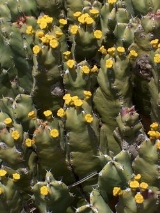
Euphorbia resinifera
Encyclopedia
Euphorbia resinifera is a species of spurge native to Morocco
, where it occurs on the slopes of the Atlas Mountains
.
growing to 60 cm tall, forming multi-stemmed cushion-shaped clumps up to 2 m wide. The stems are erect, succulent, superficially like a cactus
, four-angled, with short but sharp pairs of 6 mm spines on the angles, spaced about 1 cm apart up the stem.
coast and the Canary Islands.
which is being used as a starting point in the development
a novel class of analgesic
s. Recent research has shown that this toxin exhibits its effects by interacting with TRPV1
, a known pain sensing cation channel that also responds to capsaicin
, the primary vanilloid compound found in hot peppers.
Morocco
Morocco , officially the Kingdom of Morocco , is a country located in North Africa. It has a population of more than 32 million and an area of 710,850 km², and also primarily administers the disputed region of the Western Sahara...
, where it occurs on the slopes of the Atlas Mountains
Atlas Mountains
The Atlas Mountains is a mountain range across a northern stretch of Africa extending about through Morocco, Algeria, and Tunisia. The highest peak is Toubkal, with an elevation of in southwestern Morocco. The Atlas ranges separate the Mediterranean and Atlantic coastlines from the Sahara Desert...
.
Growth
It is a shrubShrub
A shrub or bush is distinguished from a tree by its multiple stems and shorter height, usually under 5–6 m tall. A large number of plants may become either shrubs or trees, depending on the growing conditions they experience...
growing to 60 cm tall, forming multi-stemmed cushion-shaped clumps up to 2 m wide. The stems are erect, succulent, superficially like a cactus
Cactus
A cactus is a member of the plant family Cactaceae. Their distinctive appearance is a result of adaptations to conserve water in dry and/or hot environments. In most species, the stem has evolved to become photosynthetic and succulent, while the leaves have evolved into spines...
, four-angled, with short but sharp pairs of 6 mm spines on the angles, spaced about 1 cm apart up the stem.
Distribution
It is similar to its relative Euphorbia echinus, which occurs on the MoroccanMorocco
Morocco , officially the Kingdom of Morocco , is a country located in North Africa. It has a population of more than 32 million and an area of 710,850 km², and also primarily administers the disputed region of the Western Sahara...
coast and the Canary Islands.
Chemical constituents
Euphorbia resinifera contains a high concentration of the toxin resiniferatoxinResiniferatoxin
Resiniferatoxin is a naturally occurring, ultrapotent capsaicin analog that activates the vanilloid receptor in a subpopulation of primary afferent sensory neurons involved in nociception...
which is being used as a starting point in the development
Drug discovery
In the fields of medicine, biotechnology and pharmacology, drug discovery is the process by which drugs are discovered or designed.In the past most drugs have been discovered either by identifying the active ingredient from traditional remedies or by serendipitous discovery...
a novel class of analgesic
Analgesic
An analgesic is any member of the group of drugs used to relieve pain . The word analgesic derives from Greek an- and algos ....
s. Recent research has shown that this toxin exhibits its effects by interacting with TRPV1
TRPV1
The transient receptor potential cation channel subfamily V member 1 ', also known as the capsaicin receptor and the vanilloid receptor 1, is a protein that, in humans, is encoded by the TRPV1 gene...
, a known pain sensing cation channel that also responds to capsaicin
Capsaicin
Capsaicin 2CHCH=CH4CONHCH2C6H3-4--3- ) is the active component of chili peppers, which are plants belonging to the genus Capsicum. It is an irritant for mammals, including humans, and produces a sensation of burning in any tissue with which it comes into contact...
, the primary vanilloid compound found in hot peppers.

